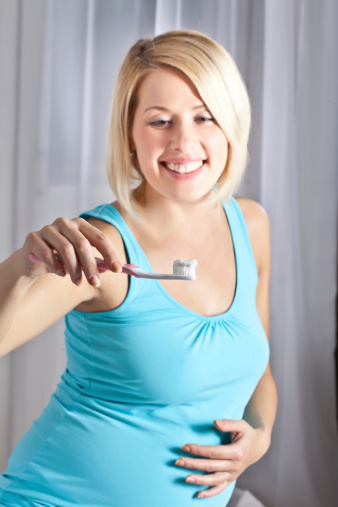Pregnancy and Your Teeth
 Pregnancy causes many changes to your body- including your mouth! Your
Pregnancy causes many changes to your body- including your mouth! Your
teeth and gums require special attention to avoid serious problems for you and your unborn baby.
What Happens: During pregnancy, the hormone surges you experience change the way your gums react to plaque, causing you to be more susceptible to gingivitis. If untreated, gingivitis can lead to more serious forms of gum disease.
The excessive bacteria from gum disease has been linked to preterm, low birth-weight babies. Research suggests that bacteria can travel through the bloodstream to the uterus and trigger preterm labor.
Your teeth may also suffer if you experience morning sickness. The stomach acids from vomiting can damage tooth enamel and increase the risk of tooth decay.
Pregnancy cravings may also account for poor dental conditions. Cravings for candy, sugary drinks or sweet snacks can add excessive sugar to your diet and cause damage to your teeth.
What to Look For: Symptoms of gingivitis include red, swollen, tender, or bleeding gums. Brushing and flossing may make these symptoms more evident or painful.
If your tooth enamel is being damaged by vomiting, or by too much vigorous brushing, you should start to feel tooth sensitivity. Certain foods or temperatures of drinks may cause pain, and you may notice your teeth becoming discolored.
Sugary snacks are likely to lead to cavities, which can cause toothaches, tooth sensitivity, dark spots or visible pits in your teeth, or pain when biting down. Cavities may not have any symptoms in the early stages, but are still present.
What To Do: Get serious about oral hygiene. Brush your teeth twice a day and pay attention to the gum line. Ask your dentist to recommend an antiplaque mouthwash, and make flossing part of your everyday routine.
If you experience frequent morning sickness, try to wait an hour before brushing your teeth, and instead rinse your mouth out with plain water. When you do brush, don’t be too rough.
Keep low-sugar snacks within reach and moderate your intake of sweets. Try to eat more calcium and vitamin D-rich foods instead.
Visit the dentist before you get pregnant, or in your first trimester if possible. X-rays should only be taken in emergencies. Most cleaning procedures are safe during pregnancy, but speak to your dentist if you have concerns about any chemicals in the treatments.

